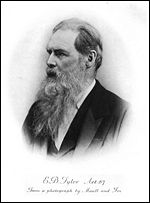Edward Burnett Tylor
Sir Edward Burnett Tylor (October 2 1832–January 2 1917), the English anthropologist, was born at Camberwell, London, the son of Joseph Tylor and Harriet Skipper. Alfred Tylor, the geologist, was an elder brother.
His parents were members of the Society of Friends, at one of whose schools, at Grove House, Tottenham, he was educated. In 1848 he entered his father's business (J. Tylor and Sons, Brassfounders) in London, but at about the age of twenty he was threatened with consumption and forced to abandon business. During 1855 - 1856 he travelled in the United States of America. Proceeding in 1856 to Cuba, he met Henry Christy the ethnologist, with whom he visited Mexico. Tylor's association with Christy greatly stimulated his awakening interest in anthropology, and his visit to Mexico, with its rich prehistoric remains, led him to make a systematic study of the science. Many of his theories based on unilineal evolution, considered racist in modern times, have been abandoned.
In 1858 Tylor married Anna Fox.
While on a visit to Cannes he wrote a record of his observations, entitled Anahuac; or, Mexico and the Mexicans, Ancient and Modern, which was published in 1861. In 1865 appeared Researches into the Early History of Mankind, which made Tylor's reputation. This book was followed in 1871 by the more elaborate Primitive Culture: Researches into the Development of Mythology, Philosophy, Religion, Language, Art and Custom. In 1881 Tylor published a smaller and more popular handbook on anthropology.
In 1871 he was elected Fellow of the Royal Society, and in 1875 received the honorary degree of Doctor of Civil Laws from the University of Oxford. He was appointed Keeper of the University Museum at Oxford in 1883, and Reader in Anthropology in 1884. In 1888 he was appointed first Gifford lecturer at the University of Aberdeen. In 1896 he became Professor of Anthropology at Oxford and was knighted in 1912.
External links
- Works by Edward Burnett Tylor. Project Gutenberg
Credits
New World Encyclopedia writers and editors rewrote and completed the Wikipedia article in accordance with New World Encyclopedia standards. This article abides by terms of the Creative Commons CC-by-sa 3.0 License (CC-by-sa), which may be used and disseminated with proper attribution. Credit is due under the terms of this license that can reference both the New World Encyclopedia contributors and the selfless volunteer contributors of the Wikimedia Foundation. To cite this article click here for a list of acceptable citing formats.The history of earlier contributions by wikipedians is accessible to researchers here:
The history of this article since it was imported to New World Encyclopedia:
Note: Some restrictions may apply to use of individual images which are separately licensed.
